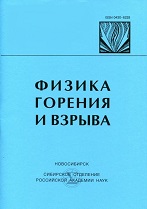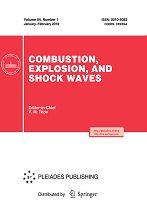|
This article is cited in 6 scientific papers (total in 6 papers)
Determination of critical conditions for detonation initiation in a finite volume by a converging shock wave
V. A. Levina, V. V. Markovb, S. F. Osinkina, T. A. Zhuravskayaa
a Institute of Mechanics at the Lomonosov Moscow State University, Moscow, 119192
b Steklov Mathematical Institute, Russian Academy of Sciences, Moscow, 119991
Abstract:
Direct initiation of spherical and cylindrical detonation in a stoichiometric hydrogen–air mixture under normal conditions by a collapsing low-pressure region (cavity) in a space bounded by a rigid shell is considered. The study of the flow with allowance for the actual mechanism of chemical reactions was performed using the finite-difference method based on the Godunov scheme, with a moving computational grid and explicit capturing of the leading shock wave and contact surface. It is established that, for a fixed pressure in the collapsing region and for its radius equal to or exceeding the known critical radius for an unbounded space, there exists a minimum (critical) shell radius, on exceeding which a detonation wave emerges in the flow field under study. In the case of spherical symmetry, the excess internal energy of the spherical layer between the shell and the low-pressure region to be spent on initiation of detonation burning attains a minimum value that far exceeds the critical energy for detonation initiation by a TNT charge in an unbounded space.
Keywords:
discontinuity decay, hydrogen–air mixture, detonation, shock wave, critical initiation energy.
Received: 08.11.2001
Citation:
V. A. Levin, V. V. Markov, S. F. Osinkin, T. A. Zhuravskaya, “Determination of critical conditions for detonation initiation in a finite volume by a converging shock wave”, Fizika Goreniya i Vzryva, 38:6 (2002), 96–102; Combustion, Explosion and Shock Waves, 38:6 (2002), 693–699
Linking options:
https://www.mathnet.ru/eng/fgv2035 https://www.mathnet.ru/eng/fgv/v38/i6/p96
|


| Statistics & downloads: |
| Abstract page: | 82 |
|





 Contact us:
Contact us: Terms of Use
Terms of Use
 Registration to the website
Registration to the website Logotypes
Logotypes








 Citation in format
Citation in format 
